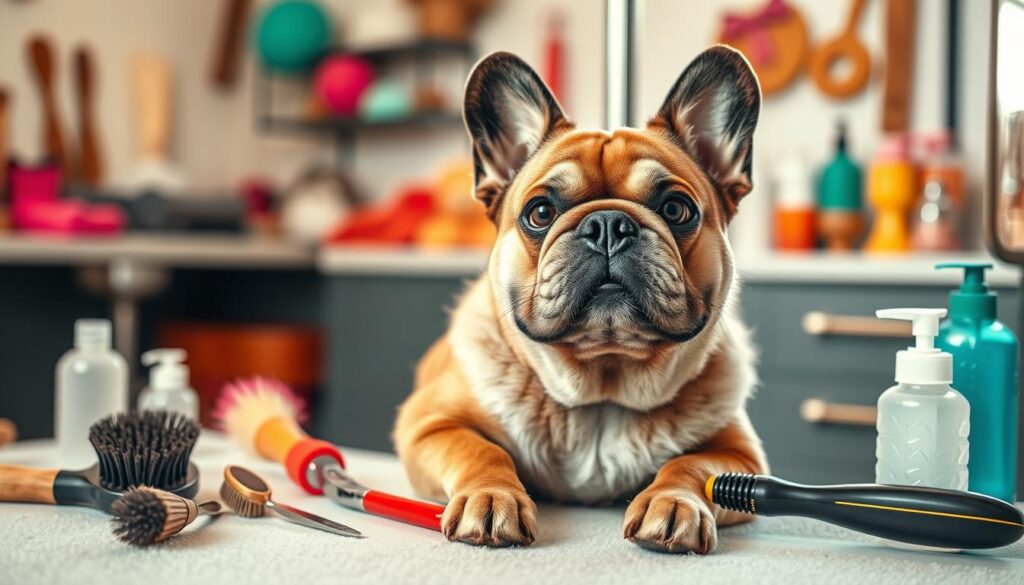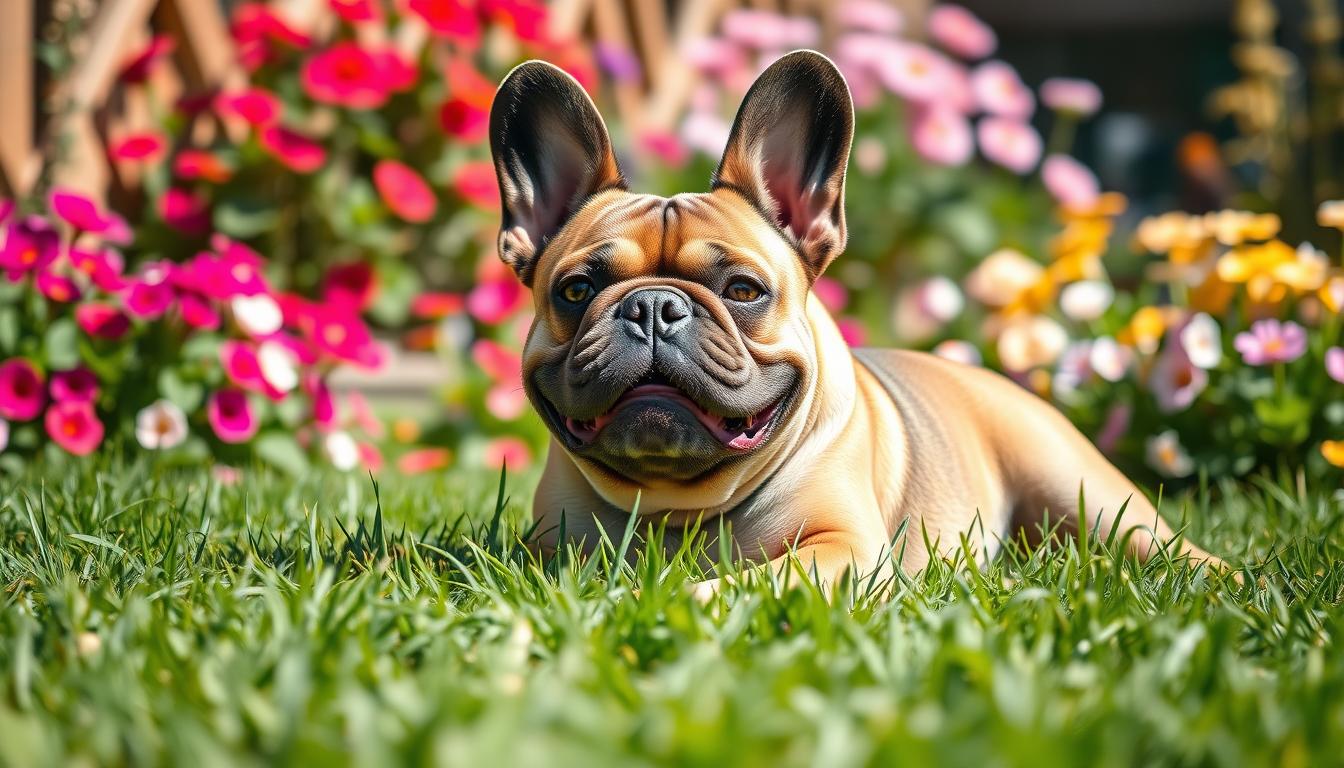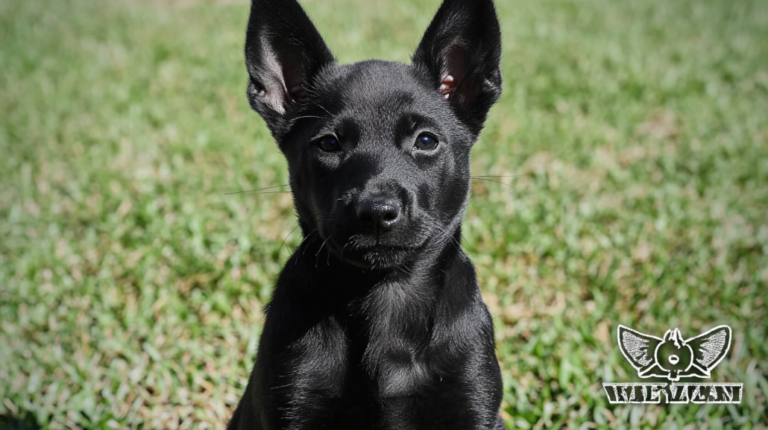French Bulldog Essentials: Personality, Grooming, and Lifestyle
Imagine a loyal companion with a captivating personality, a wrinkled face, and those endearing bat-like ears – that’s the French Bulldog. These dogs are beloved by people worldwide. As a proud Frenchie owner, I can attest to the joy and laughter they bring into our lives.
Their compact size, easy-going nature, and affectionate disposition make them perfect for urban dwellers and families alike,French Bulldogs live between 10 to 12 years. They reach their full-grown size by 12 months old. They stand 11 to 13 inches tall and weigh 18 to 28 pounds.
Their smooth, short coat requires minimal grooming. They only need a bath every 4-6 weeks, unless they’ve rolled in something messy. Frenchies don’t need a lot of exercise but do need about 45 minutes to an hour of activity each day to stay healthy and content.
If you’re considering adding a French Bulldog to your family or you’re already a proud parent, this guide is for you. It covers the essential aspects of caring for these delightful dogs. From their unique personalities to their grooming needs and lifestyle requirements, get ready for a journey of unconditional love, laughter, and companionship that only a Frenchie can provide.
Here is a table with an overview of the French Bulldog:
| Attribute | Details |
|---|---|
| Official Name | French Bulldog |
| Common Name | Frenchie |
| Pet Height | 11-12 inches (28-31 cm) |
| Pet Weight | 16-28 pounds (7-13 kg) |
| Lifespan | 10-12 years |
| Smartness Level | Moderate |
| Engagement in Play | Low to Moderate |
| Human-Friendly | Very friendly, affectionate |
| Animal-Friendly | Generally good with other pets |
| Favorite Food | High-quality dog food, treats |
Understanding the French Bulldog’s Unique Personality
The Bouledogue Français, also known as the Frenchie or Clown Dog, has a special personality. These little dogs are full of love and loyalty. They love to be close to their people, weighing under 28 pounds.
Affectionate and Loyal Companions
French Bulldogs are true companions. They love their owners and show it with lots of affection. Their playful nature makes them great with kids and other pets, too.
Playful Yet Calm Temperament
Frenchies are playful but also calm. They enjoy short playtimes and then like to relax. This makes them perfect for city living.
Socialization Needs for Your Frenchie
It’s important to socialize your Bouledogue Français early. They can be shy or stubborn if not introduced to new things. Introduce them to many people and places to help them grow confident. Training a Frenchie needs patience and consistency, but it’s worth it.

Grooming Your French Bulldog
French Bulldogs are a Brachycephalic breed with low grooming needs. Yet, a regular grooming routine is key to their health and appearance.
Bathing and Brushing Techniques
Brush your French Bulldog weekly to avoid matting and keep their coat shiny. Wash them every 4-6 weeks using a shampoo made for dogs. This prevents oil loss from their skin.
Nail Care and Ear Cleaning
Trim your French Bulldog’s nails every 2-4 weeks to prevent discomfort and joint issues. Clean their ears every 3-4 weeks to avoid infections.
Recognizing Skin Sensitivities
Watch for signs of skin allergies and sensitivities in French Bulldogs. Use a vet-recommended moisturizer for dry skin and address any changes promptly.
| Grooming Task | Recommended Frequency |
|---|---|
| Brushing | At least once a week |
| Bathing | Every 4-6 weeks |
| Nail Trimming | Every 2-4 weeks |
| Ear Cleaning | Every 3-4 weeks |
| Dental Care | 2-3 times per week |
By sticking to these grooming tips, you can keep your Brachycephalic French Bulldog in top shape. Regular care and attention to their needs will keep your Farting Hippo happy and healthy.

Nutrition for French Bulldogs
As Apartment Dogs and Companion Dogs, French Bulldogs need special food to stay healthy. They love a diet full of good proteins, carbs, and fats. Knowing what to feed and how much helps keep your Frenchie fit.
Choosing the Right Dog Food
Choose dog food with real, whole foods. Stay away from fillers and artificial stuff. Your Frenchie should eat proteins like chicken and fish. Carbs from grains and veggies give energy. Fats from fish oil keep their coat shiny.
Portion Control and Feeding Schedule
French Bulldogs need 1-1.5 cups of dry food a day, in two meals. Puppies eat more often because they need more calories. Watch their weight to avoid obesity.
Dealing with Food Allergies
Some French Bulldogs get food allergies, causing skin and digestive problems. Try feeding them a simple diet or fresh, homemade meals. This can help manage allergies.

Health Considerations for French Bulldogs
French Bulldogs are loved for their fun nature and unique ears. But, they face special health problems that need careful care from their owners.
Common Health Issues to Watch For
French Bulldogs often get skin issues, ear infections, diarrhea, and eye problems. Their short noses can cause breathing trouble. They also might have hip, elbow, or back problems.
Regular Vet Check-ups and Vaccinations
Keeping your Frenchie healthy is key. Regular vet visits help catch problems early. Make sure they get all their shots to avoid sickness.
Importance of Exercise and Weight Management
French Bulldogs need the right amount of exercise and should watch their weight. They should get 12-45 minutes of walk time each day. This helps them stay healthy and avoid obesity.
By being careful and giving your French Bulldog the right care, they can live a happy, healthy life. Their health is very important to you.
Training Your French Bulldog
Having a French Bulldog, or a Clown Dog, brings its own set of training challenges. These lively, charming pups are known for their stubborn streak. This makes consistent and positive reinforcement-based training essential. Understanding their training needs can help you unlock their full potential.
Mastering the Basics: Obedience Training for Your Frenchie
Early obedience training is crucial for channeling a French Bulldog’s exuberant nature. Start with the basics like sit, stay, and come. Use small, tasty treats as rewards. Keep sessions brief, around 3-5 minutes, to keep your Clown Dog’s attention.
Consistency is key, so practice these commands regularly. This reinforces the desired behaviors.
Addressing Behavioral Challenges
French Bulldogs may face common issues like separation anxiety, excessive barking, and leash pulling. Tackle these behaviors promptly through positive reinforcement training. Reward-based methods, such as praising and treating your Velcro Dog for calm, desired actions, can effectively modify undesirable behaviors.
Seek the guidance of experienced trainers if you encounter persistent problems.
The Power of Positive Reinforcement
French Bulldogs thrive on praise and attention, making positive reinforcement techniques the most effective approach to training. Break treats into tiny pieces to provide more opportunities for rewards during sessions. This is because Frenchies are susceptible to weight gain.
Gradually increase the duration of training sessions and the difficulty of commands. This challenges your Clown Dog and keeps them engaged.
By embracing the power of positive reinforcement, you can transform your Velcro Dog into a well-behaved companion. With time, practice, and a touch of creativity, you’ll unlock the full potential of your Clown Dog’s trainability.
Creating a Comfortable Living Environment
As Apartment Dogs and devoted Companion Dogs, French Bulldogs need a cozy and safe home. They can do well in any size of living space. It’s important to set up their home right for their happiness and health.
Setting Up Your Home for Your Frenchie
To make a comfy living space for your French Bulldog, think about these key things:
- A cozy and supportive bed for relaxation
- Durable chew toys and interactive puzzle feeders to stimulate their minds
- Non-slip, easy-to-clean flooring to prevent accidents
- Proper temperature control to keep your Frenchie comfortable, as they are sensitive to extreme heat and cold
Essential Dog Supplies You’ll Need
Having the right supplies is key to meeting your French Bulldog’s needs. Make sure to get:
- High-quality dog food and water bowls
- Grooming tools, such as a soft brush and ear cleaning solution
- Comfortable bedding and blankets
- Different toys to keep your Frenchie happy and engaged.
Safe Spaces for Relaxation
French Bulldogs do best with their own special spots in the house. Create cozy areas, like a soft-lined crate or a quiet corner with their favorite toys. These spots help your Frenchie feel safe and relaxed.
“Celebrating a French Bulldog’s unique personality can greatly enhance their quality of life.”
By focusing on your Frenchie’s needs, you can make a home that’s both comfy and stress-free. With the right supplies and a bit of creativity, you can create a space that you and your Apartment Dog will both enjoy.
Exercising Your French Bulldog
French Bulldogs, being Brachycephalic dogs, need a careful balance of exercise. They are not the most energetic, but they still need daily activity. This keeps them moving and mentally engaged.
Daily Activity Requirements
Vets say French Bulldogs need 20 to 30 minutes of walking each day. This helps them stay healthy and avoid health problems. But, watch your Frenchie’s breathing closely, especially in hot weather. This is because of their Brachycephalic traits.
Fun Games and Activities to Try
- Interactive toys like treat dispensing puzzles and feeders to provide mental stimulation
- Gentle tug-of-war games, but with close supervision to prevent accidental bites or fatigue
- Low-impact exercises like swimming to improve joint health
- Agility training with obstacle courses set up at home to enhance balance and coordination
- Hide-and-seek games to promote bonding and keep your Frenchie’s mind active
Recognizing Signs of Overexertion
Pay close attention to your French Bulldog’s signs. Adjust their activity level if needed. Signs of overexertion include a lot of panting, trouble breathing, or feeling tired. If you see these signs, it’s time to take them inside, give them water, and let them rest.
By finding the right balance between exercise and rest, your French Bulldog can live a healthy, happy life. Remember, these special Companion Dogs do best when their exercise needs are met with care and thought.
Traveling with Your French Bulldog
Your Frenchie is more than just a pet; they’re your best friend. They should accompany you everywhere. Whether you’re driving or flying, there are important things to remember for a safe and fun trip for your furry friend.
Preparing for Road Trips
Plan to stop often on road trips so your Frenchie can move around and go to the bathroom. Make sure your car has good air flow. Don’t forget a portable water bowl to keep your Frenchie hydrated.
Safety Tips for Air Travel
Traveling by air with a Frenchie needs extra care because of their breathing issues. Look for airlines that allow pets and book early. Make sure they have a spot under your seat. Bring a carrier that meets TSA rules and a health certificate from your vet.
Let your Frenchie go to the bathroom before you fly. Use a harness approved by your vet to keep them safe during the flight.
Choosing Pet-Friendly Accommodations
- Search for hotels and rentals that welcome Frenchies and other dogs.
- Check the pet policy and any extra costs or rules before you book.
- Make sure the place is cool and comfy for your Frenchie.
- Ask about places to let your Frenchie go and nearby parks or trails.
Traveling with your Frenchie needs planning, but it’s worth it. With the right care, you and your Frenchie can have amazing adventures together.
Socializing Your French Bulldog
Socializing your French Bulldog is key for their growth into friendly, adaptable pets. Known as the “Velcro Dog” and “Clown Dog,” they love people and play. Early socialization keeps these traits alive.
Importance of Early Socialization
The first 3 to 14 weeks are crucial for a French Bulldog puppy. Positive socialization during this time lowers the risk of anxiety and aggression. It’s vital to introduce them to many people, animals, and places.
Meeting Other Dogs and People
French Bulldogs are pack animals and do well in a hierarchy. Start with short visits to parks or friends’ homes. This helps them get used to new places. Also, introduce them to people of all ages and backgrounds.
Tips for Structured Playdates
Playdates with other dogs can boost your Frenchie’s social skills. Always look out for them to ensure their safety. Touch their paws, ears, and mouth often to get them used to being handled. Socialization is ongoing, not just during the critical period.
“Socialization is the key to raising a well-adjusted French Bulldog. Expose your pup to new sights, sounds, and experiences early and often to help them grow into a confident, friendly companion.”
Understanding French Bulldog Behavior
French Bulldogs, also called “Companion Dogs” or “Velcro Dogs,” have unique and loving personalities. To strengthen your bond with your Frenchie, it’s key to know their body language and common signs.
Reading Your Dog’s Body Language
Watching your French Bulldog’s body language helps you guess their mood and needs. Look at their ears, eyes, and tail. These can show how they’re feeling. For instance, up ears and a wagging tail mean they’re excited. But, flat ears and a tucked tail might show they’re stressed or anxious.
Common Signs of Stress or Anxiety
- Excessive panting or yawning
- Avoiding eye contact or turning away
- Trembling or shaking
- Destructive behaviors, such as chewing or scratching
Spotting these signs helps you meet your Frenchie’s needs and calm them down. This can reduce their stress or anxiety.
Building a Strong Bond Through Interaction
French Bulldogs love attention and affection from their owners. Enjoy playtime, teach them tricks, and share cuddles. They are known as “Velcro Dogs” because they stick close to their family. Be gentle with them when you leave, as they can get anxious about being alone.
By understanding your French Bulldog’s behavior, you can build a caring and rewarding relationship. This will bring joy and companionship into your life.
Finding the Right French Bulldog Breeder
Choosing the right breeder for a French Bulldog, or Frenchie, is key. Ethical breeders care about their dogs’ health and ensure you bring home a healthy, happy companion.
Look for breeders who are part of groups like the American Kennel Club (AKC) or the French Bulldog Club of America (FBDCA). These groups have high standards for breeding.
Key Traits of a Responsible Breeder
Good breeders give you references from happy buyers. This lets you see how they treat their dogs and puppies. They should also share health tests and DNA results.
They check their dogs for genetic problems. This helps make healthier puppies.
Questions to Ask Before You Buy
Ask about how the breeder socializes their dogs. Early socialization is key for a happy dog. Also, ask to see the puppy’s parents or videos of them.
This helps you understand the puppy’s personality and health.
Adoption vs. Purchasing a Frenchie
You can buy a French Bulldog from a breeder or adopt one. Adopting can be cheaper and you might find a loving dog in need of a home. Your choice depends on your situation and what’s available locally.







